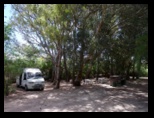
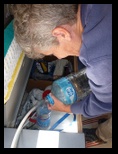

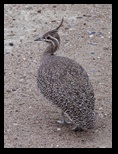
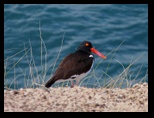
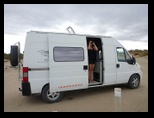
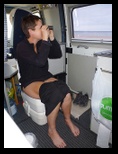
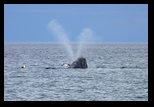
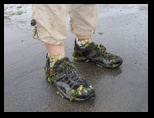
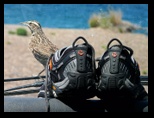
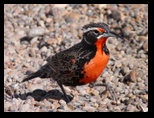
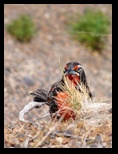
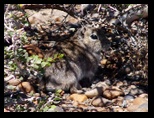

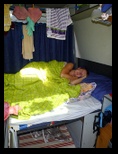
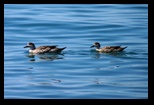
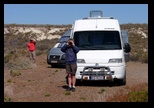
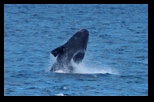
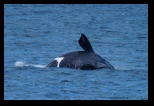
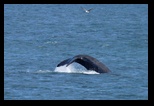
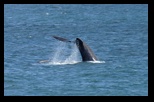
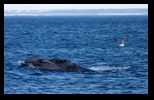
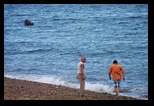
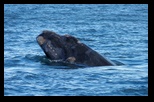
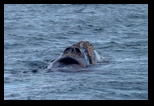
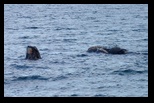

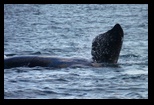
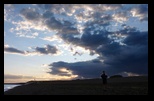
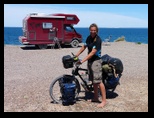
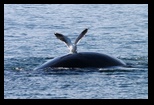
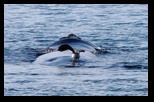



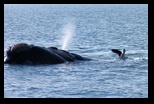
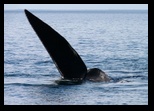

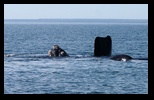
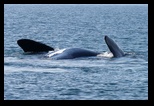
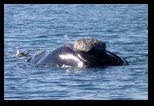


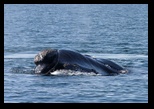
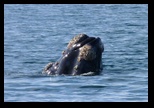
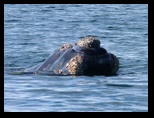
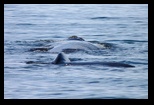



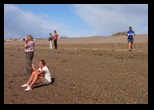
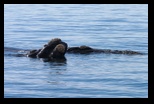

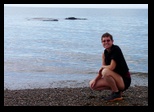
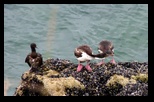

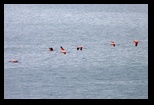
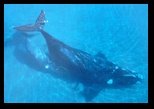

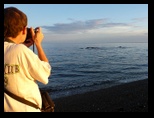
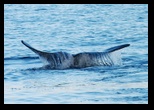
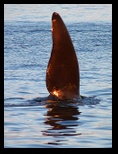


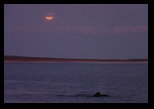
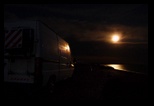

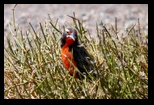
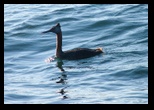
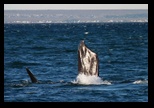
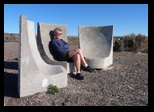
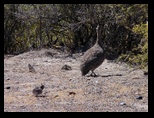
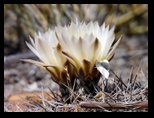
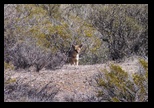
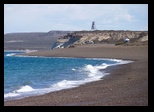

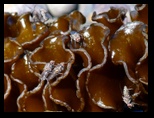

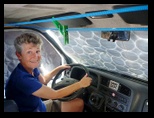
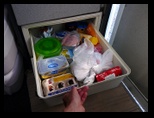
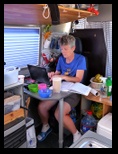
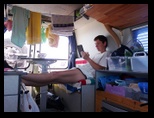
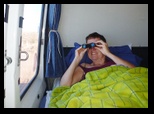
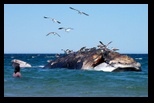
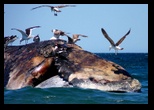
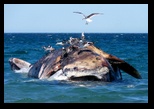
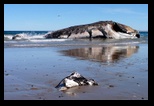

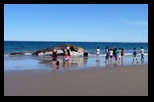

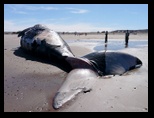
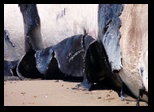


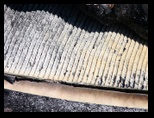
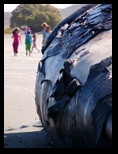
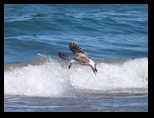
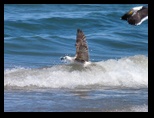
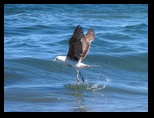
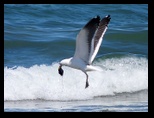


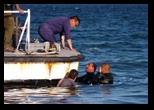
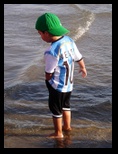
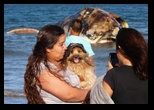
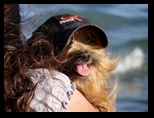


Click on a photo to enlarge it.
On our route down to the Península Valdés we stopped at a petrol station in Sierra Grande for the night. They had a very nice picnic area behind the station and we could also fill up our large 40 litre containers with water. Then we drove down to Puerto Madryn and stayed right next to the sand dunes on the beach for the night.
Península Valdés is one of the most important wildlife reserves in Argentina and was designated a Unesco World Heritage Site in 1999. It is the breeding ground for southern right whales, elephant seals, and sea lions, and the nesting site for thousands of shore birds, including pelicans, cormorants, and oyster catchers.
Puerto Pirámides, 95km (59 miles) from Puerto Madryn, was once a major centre for whaling and trading in seal skins. In the 19th century there were more than 700 whalers operating in these waters. An international protection treaty was signed in 1935 and since then the whale population has recovered slowly, now standing at approximately 2,500. The whales come to breed near these shores around July and stay until mid-December.
Weighing up to 50 tonnes and measuring up to 18m in length (the females are larger than the males), these gentle leviathans are filter-feeders, deriving nutrients from the plankton they sift from the seas with their baleen plates. The name comes from them being the "right" whales to harpoon - they were slow, yielded copious quantities of oil and floated when killed.
Despite protection the southern right whale is the most endangered whale. They have been having fewer calves because of diminished krill in feeding grounds near the South Georgia Islands - the consequence of a warming climate. There is also a problem here at Península Valdés. Gulls feed off live whales by pecking on their backs. This produces lesions that can lead to infection.
We went to the Tourist Information centre in Puerto Madryn and found out that there is an entrance fee of 260 pesos per person for Península Valdés in order to get to the Whale tours which cost 890 pesos. It was going to cost us $150 just to get on a boat tour for 2 hours. Hmm! We would have to think about that!
We have already been here in 2002 and we know that the drive around the peninsula is 210km on washboard and sand roads. Plus you are not allowed to camp overnight which means driving all of it it one day and at 30km per hour on the bad roads it would take 7 hours. Not much time left to stop and watch for whales, Orcas and other wildlife. There is a more direct route but that is 180km return along bad roads. We weren't sure if we wanted to shake, rattle and roll that far.
The info centre also confirmed a free camping area on the way to the peninsula in a protected area along the coast. The camping area would be a 15km drive and only the final 8km is unpaved. So we went to do some shopping and drove off to that area.
The unpaved part of the road wasn't too bad and we parked up at Playa El Doradillo where we stayed for 2 nights. We had only been there a couple of hours when we saw the first southern right whale - a mother and baby. It was bit too far off for decent photos. The whales had gone into the next bay so we tried to walk around the headland but I got stuck in thick seaweed!! I thought it was just a thin layer over the pebbles but it was so deep it came up to my calves and I nearly lost my trainers trying to get out! It stank to high heaven and I had to go into the sea to wash off the smelly stuff. Then had to wash everything and hope it dried by the next day - I only have one pair of trainers!
 Winnietwo at Playa El Doradillo - 360° Panorama
Winnietwo at Playa El Doradillo - 360° Panorama
(move mouse over panorama and click on the arrows)
We didn't see any more whales the next day so, on the following day, we drove 5km further along the unpaved road to Playa Las Canteras and parked up at the pebble beach. A very good decision.
We ended up seeing lots of whales and their babies and stayed for another 7 nights. The whales came at high tide. The beach here drops away steeply so at high tide the whales have enough space to get really close to the beach. We were also lucky that we were here for a full moon and the high tides are higher than at other times during the month.
Southern Right Whales jumping in the Golfo Nuevo
We spent hours watching, taking photos and videos, generally from around 7am to 10-30am and then from around 4-30pm to 7pm. We saw them jumping (two thirds of their bodies come out of the water), mothers turning onto their backs so that the babies can swim on top of them to feed, and whales slapping the water using one of their large fins.
We took so many videos and photos that it took us hours to work on them afterwards and we needed a lot of solar power to run the computer. Fortunately most of the time it was sunny. It was also hard work walking along the beach that is thick with pebbles, following the whales as they swam along. We walked for miles.
Sometimes we were woken up by other campers who knocked on our door and sometimes the whales woke us up when they blew out of their spouts as they past us. So we had to dash out of bed to see them. I even made us cups of tea and carried them out along the beach so that we didn't get too dehydrated - we were out for hours!
We could even whale watch from the motor home - from the bed and even from the toilet!! There were a number of other campers and even a cyclist. Astrid from Austria, has spent the last 3.5 years cycling around the world - from Europe through Asia to Indonesia and flew over to South America a few months ago to continue. She joined us for a meal even though we were running out of food - we had only bought enough for a few days not realising how long we would be staying.
The next day we drove back to Puerto Madryn to stock up on food and drinking water and went back to our spot for another 5 days. It wasn't long before we heard a whale blowing and dashed out for more photos for over an hour. What a great day - it started and finished with the whales. We could still hear them blowing throughout the night!
Southern Right Whales in the Golfo Nuevo - Part 2
The next morning we watched the whales from the bed without getting up! Are we getting lazy or what! Well, it was too early and we managed to get a bit more sleep afterwards! The whales came even earlier the next day - 6-25 am. We spent another couple of hours watching them but the wind was really cold. When the whales came back later that evening it was so cold and windy that we sat in the front cabin to watch. We had to put the wipers on to clean the front window! Our kind of whale watching tour!
The last two days we were there it was very cold and windy and the sea was very choppy. We only saw two whales swimming by but it wasn't any good for photos. Unfortunately the last whale we saw was a dead one. Kirsten thought it was an island quite far out and I thought it was a boat because it was moving towards the coastline. When we got the binoculars out we realised it was a whale and was heading fairly fast towards a bay a few kilometres away.
We drove over there and the whale had already landed on the beach. The coast guard turned up and said that around 40 whales die each year in the region. They thought that this particular whale had died of an infection. A boat came to drag it out to sea. Two men in wetsuits dug underneath the fluke and tied a thick rope around it. They took the rope out to the boat but the crew tied it to the front of the boat! Were they going to drag the whale out in reverse?? The whale was bigger and looked heavier than the boat!
The crew obviously realised their mistake and moved the rope to the back of the boat but the pilot turned the boat and we all knew what was going to happen. Well, everyone except the crew. The rope got caught in the propellers!! Then they tried to get the rope off and had to cut it. But it was too late for the boat. A much larger boat had to be sent to tow the smaller one back to port! What a farce!
Dead whale at Playa El Doradillo
Extract from Wikipedia."One possibly significant contributor to the mortality rate has alarmed scientists - since at least 1996, kelp gulls off the coast of Patagonia have been observed attacking and feeding on live right whales. The kelp gull uses its powerful beak to peck down several centimetres into the skin and blubber, often leaving the whales with large open sores - some of which have been observed to be half a metre in diameter. This predatory behavior, primarily targeted towards mother/calf pairs, has been continually documented in Argentinian waters, and continues today. Observers note that the whales are spending up to a third of their time and energy performing evasive manoeuvers - therefore, mothers spend less time nursing, and the calves are thinner and weaker as a result. Researchers speculate that many years ago, waste from fish processing plants allowed the gull populations to soar. Their resulting overpopulation, combined with reduced waste output, caused the gulls to seek out this alternative food source. Scientists fear that the gulls' learned behaviour could proliferate, and the IWC Scientific Committee has urged Brazil to consider taking immediate action if and when similar gull behaviour is observed in their waters. Such action may include the removal of attacking gulls, following Argentina's lead in attempting to reverse the trend".
Whilst the coast guard were trying to remove the whale Regula and Jörg arrived - I had met them in Paraiso Suizo two months ago and it was great to see them again. We all drove back to Las Canteras and then another couple turned up, Pascal and Arianne, who had also stayed at Paraiso Suizo whilst I was there! It was quite a reunion!
It was very windy and cold the next day and the sea was very rough. There were no whales and it seemed that they may have all left for their feeding grounds near South Georgia Island. Unfortunately our friends only got to see a dead whale. We were extremely lucky to have been there at the right time during the full moon and highest tides. It had been a truly wonderful experience and one we'll never forget.